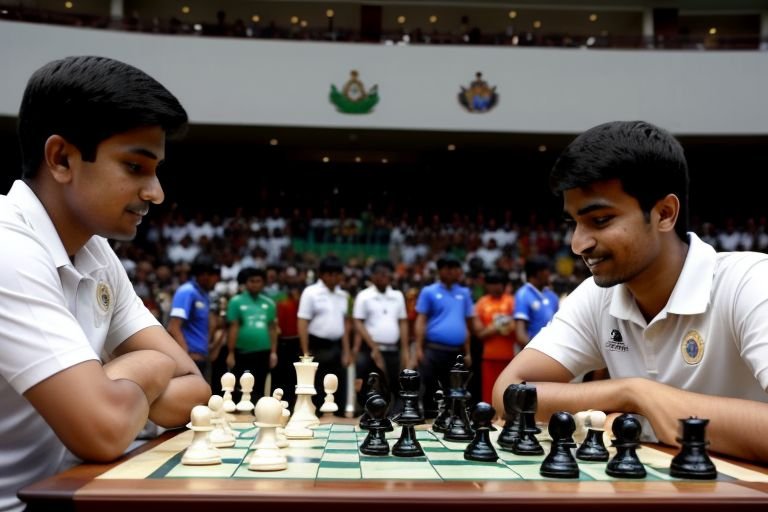For the first time in chess history for India, teams of India won gold medals in both the categories, open and women, in the just concluded 45th Chess Olympiad held in Budapest. It is the first time that India has clinched gold in the open group and only the second occasion in the women’s group.
The Indian open team, being led by a young teenage sensation D. Gukesh, emerged deserved winners of the gold by outclassing Slovenia in the final round. Top seeded Gukesh too came up with the goods as he delivered a win on the top board and thus won the match for India. Along with Praggnanandhaa, the team had Vidit Gujrathi, Arjun Erigaisi, R. Praggnanandhaa, and Pentala Harikrishna who managed to bag 18 match points from a maximum of 22 match points.
In the female team event, the Indian team which included Koneru Humpy, D. Harika, R. Vaishali, Tania Sachdev and Bhakti Kulkarni defeated a formidable Azerbaijani side to clinch gold. Collectively the team maintained a good performance throughout the event and the they had accumulated 17 match points.
It was successful the Indian teams at the Chess Olympiad that they have grown in the sport and became a force to reckon with. In the last decade or so India has been giving talents who are nowegrated into the world circuit Currently the young talents like Gukesh, Praggnanandhaa and Vaishali etc.
The win is especially pleasing for Gukesh, who has been outstanding throughout the competition. The teenager’s result in the top board, especially against some of the best players in the world was rated highly by international chess masters. They cannot deny that he is good under pressure and scores important victories for the Indian team.
The other notable win that the author under analysis highlights is gold won by the Indian women’s team which is equally an achievement given the stiff venter they had. The position of the Indian team was boosted by a seasoned, Koneru Humpy on the top board and the others chipped in with some important points.
This double gold medal triumph is anticipated to open a new era of chess in India. The country has been supporting chess development programs in the past few years and this victory at the prestigious level should lure more young talents towards serious involvement in the sport.
The Chess Olympiad is the most important team championship occurring biennially and featuring both individual and team classifications. Last year’s edition attracted well over 180 countries, meaning India’s feat is even more impressive this year.
The Indian team has received a lot of applause back home and congratulatory messages have been received from all corners. The Prime Minister of India took to tweeter and congratulated the lions for the great achievement stating that it is a proud moment for India.
However, this victory seems to be a harbinger of good things happening to Indian chess in the future. This could create even more support for future programs or for chess in general throughout the country and possibly set the stage for the country to become a powerhouse for chess in the next few years.
It is always encouraging to see more young talent coming through and future stars of Indian chess such as Gukesh and Praggnanandhaa. These players, are young and are still below the age of 20 years and have shown that they are capable of competing with the world’s best so, what will they produce in the next five to ten years if necessary measures are taken for their welfare and proper growth are put in place. If provided adequate encouragement and guidance, they can easily make a transit to the level of world champions in the future.
While the chess community congratulates India for the accomplishment, there is a question as to where it will go from there. Now the Indian chess administrators are standing before the task to make use of this victory as the key stone to further develop the sport in the country.
For now, however, the focus remains with this and this is the best way to welcome this historic moment. Indian chess players have created history and the great event will be remembered by generations of chess players.









